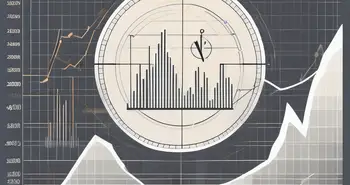Spot vs Futures: Understanding the Differences

When it comes to trading, knowing how and when to apply the right strategy is important. Spot trading and futures trading may seem similar, but they offer very different paths to success. Each has its own set of advantages, risks, and practical applications that can significantly impact your investment outcomes.
In this article, we’ll explore the ins and outs of both markets, highlight their key differences, and give you practical insights to help you make the most of each. Whether you're aiming for immediate gains or looking to hedge against future risks, understanding how spot and futures trading work will sharpen your edge in any market.
What is a Spot Market?
The spot market is where financial instruments, such as stocks, commodities, or cryptocurrencies, are bought and sold for immediate delivery. This means that when you make a transaction in the spot market, the asset is exchanged right away, at its current market price.
The term “spot” comes from the immediacy of the transaction—you’re buying or selling the asset “on the spot.” Prices in spot markets are determined by the forces of supply and demand, and this makes spot prices a direct reflection of the asset’s real-time value.
Example of Spot Market (Bitcoin Purchase)
Let’s take Bitcoin as an example. If you bought 1 Bitcoin on the spot market in December 2017 when the price hit $19,000, the transaction was settled immediately, and you became the owner of that Bitcoin at that price.
Now, if the price of Bitcoin increased to $63,770 a few years later, you could sell it at the current spot price and profit from the difference. Spot trading in this case allowed you to capitalize on Bitcoin's price appreciation over time, with no need for future contracts or leverage.
How Spot Markets Work
Spot markets operate with the concept of real-time transactions. Buyers and sellers agree on the current price of the asset, and the exchange takes place almost immediately. The settlement period typically ranges from the same day up to two business days, depending on the asset and platform being used.
Key Features of Spot Markets
- Real-time pricing: Prices fluctuate based on immediate market conditions.
- Immediate ownership: You own the asset right after the transaction is completed.
- Lower risk: Since there’s no future obligation, risks are primarily tied to the asset’s present performance.
This makes spot markets ideal for day traders and short-term investors who want immediate access to their assets.
What is a Futures Market?
The futures market involves the trading of contracts that agree to buy or sell an asset at a predetermined price on a specific future date. Instead of owning the asset immediately, you agree to take delivery (or settle the contract in cash) at some point in the future. This allows traders to speculate on the future price movements of an asset.
Futures contracts are widely used for speculation and hedging. Traders can benefit from price changes without actually owning the asset until the contract’s expiration date.
Example of Futures Market (2020 Oil Price Crash)
One of the most notable instances of futures trading occurred during the 2020 oil price crash. Due to a significant drop in demand caused by the COVID-19 pandemic, oil futures prices plummeted, even briefly turning negative in April 2020.
For example, the May futures contract for West Texas Intermediate (WTI) crude oil dropped to a shocking -$37.63 per barrel. Traders who held contracts to take delivery of oil at the time had to pay others to take the contracts off their hands due to the lack of available storage for physical oil.
This unprecedented event highlighted the potential risks and complexities of futures trading, especially when the underlying asset, in this case, oil, faces unforeseen circumstances. In contrast, traders in the spot market did not face such an extreme situation because spot prices, while low, never turned negative.
How Futures Markets Work
Futures contracts specify the price at which the asset will be bought or sold, as well as the expiration date when the transaction will occur. In most cases, traders do not actually take possession of the asset; instead, they close out the contract before the expiration date to lock in profits or avoid losses.
Key Features of Futures Markets
- Leverage: Futures trading allows you to control a large position with a small amount of capital.
- Expiration dates: Each contract has a specific expiration date, after which it is settled.
- Hedging and speculation: Futures are commonly used to manage risk or to bet on price movements.
Looking to anticipate future price movements with precision?
Morpher AI provides powerful market insights and real-time price predictions for a wide range of assets. Whether you're tracking commodities, cryptocurrencies, or stocks, Morpher AI helps you stay ahead of the market, offering the tools to speculate on future trends with confidence. Explore Morpher AI Now.

Spot vs Futures Markets: Key Differences
Now that we understand the basics, let's explore the key differences between spot and futures markets.
Pricing Mechanism
Spot Market: Prices are determined in real-time by the current demand and supply of the asset.
Futures Market: Prices are based on the current spot price, interest rates, dividends and time remaining until the contract expires.
Ownership and Settlement
Spot Market: When you buy in the spot market, you own the asset immediately, and the transaction settles within a short period.
Futures Market: Ownership is based on a contract for future delivery, meaning you don’t own the asset until the contract expires or is closed out.
Risk and Leverage
Spot Market: The risk is limited to the real-time value of the asset. There’s no leverage, which means you need to put up the full capital for the asset.
Futures Market: Futures allow traders to leverage their position, which can amplify both gains and losses. However, this also introduces greater risks, including margin calls if the market moves against your position.
Advantages and Disadvantages of Spot and Futures
Spot and futures markets each have their own set of advantages and disadvantages to consider.

Spot or Futures: Which Should You Choose?
Your decision to trade in spot or futures markets depends on your investment goals, risk tolerance, and trading experience.
For Beginners: Spot trading is simpler and safer, as it doesn’t involve leverage or future contracts. It’s ideal for short-term traders looking for straightforward transactions.
For Experienced Traders: Futures trading can be a powerful tool for hedging and speculation, offering the possibility of high returns. However, it requires a deeper understanding of leverage, margin, and market dynamics.
Factors to Consider:
Risk tolerance: If you’re risk-averse, spot trading may be more suitable. If you’re comfortable with high risk and volatility, futures trading could offer better opportunities.
Capital: Spot trading requires the full capital upfront, while futures allow for trading with a fraction of the asset’s value.
Market strategy: Spot trading is often better for day traders and short-term investors, while futures trading is more appropriate for hedgers and those speculating on long-term trends.
Example: Gold Spot vs Futures Trading
Gold is a popular asset for both spot and futures trading. In the spot market, if you bought an ounce of gold in 2019 when it was priced around $1,300, you would have immediate ownership of the physical asset or its equivalent.
However, futures traders often buy gold contracts speculating that prices will rise. For instance, if you bought a gold futures contract in early 2020, predicting a rise due to global economic uncertainty, you would have benefited when gold prices surged to over $2,000 per ounce during the pandemic. This shows how futures contracts allow traders to profit from significant price changes without owning the actual asset at the time of purchase.
Spot vs Futures: FAQ
What are spot and futures markets?
Spot markets involve immediate buying and selling of assets at the current market price, while futures markets involve trading contracts for future delivery of an asset at a predetermined price.
What are the key differences between spot and futures markets?
Spot markets offer immediate settlement, while futures markets have predetermined settlement and delivery dates. Spot prices are determined by real-time supply and demand, while futures prices reflect various factors, including the current spot price and time remaining until contract expiration.
Which is better, spot or futures trading?
The choice between spot and futures trading depends on your investment goals, time horizon, risk tolerance, and available capital. Both have their own advantages and disadvantages, so it's important to carefully consider these factors before making a decision.
How do spot and futures markets contribute to the financial market ecosystem?
Spot markets influence current market prices and provide the basis for futures pricing, while futures markets contribute to liquidity and facilitate effective price discovery.
Discover the innovative world of Morpher, where you can trade effortlessly across various asset classes. With Morpher, you’ll experience the future of investing, featuring zero fees, infinite liquidity, and the power of fractional investing. Amplify your trading potential with up to 10x leverage and take advantage of the flexibility to go long or short on any asset. Secure your trades with the Morpher Wallet and enjoy full control over your investments. Join Morpher today and claim your Free Sign-Up Bonus to kickstart your trading journey. Start Trading on Morpher Now.

Disclaimer: All investments involve risk, and the past performance of a security, industry, sector, market, financial product, trading strategy, or individual’s trading does not guarantee future results or returns. Investors are fully responsible for any investment decisions they make. Such decisions should be based solely on an evaluation of their financial circumstances, investment objectives, risk tolerance, and liquidity needs. This post does not constitute investment advice.

Painless trading for everyone
Hundreds of markets all in one place - Apple, Bitcoin, Gold, Watches, NFTs, Sneakers and so much more.

Painless trading for everyone
Hundreds of markets all in one place - Apple, Bitcoin, Gold, Watches, NFTs, Sneakers and so much more.









